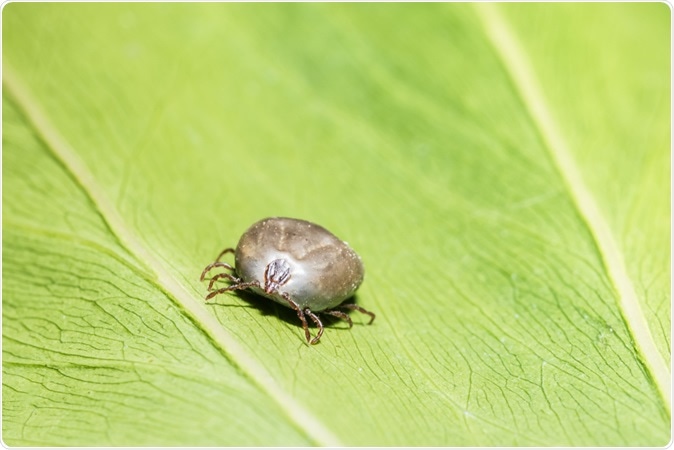The Centers for Disease Control and Prevention (CDC) has warned about the spread of tick borne diseases across the United States in its Morbidity and Mortality Weekly Report that was released this week.
The report warns the general public about the threats posed by the Asian longhorned tick (Haemaphysalis longicornis) that has been spreading across several US states since 2017. The Asian long horned tick is an arachnid that is native to Korea and other parts of east Asia. Ben Beard, Ph.D., deputy director of CDC’s Division of Vector-Borne Diseases, in a statement said, “The full public health and agricultural impact of this tick discovery and spread is unknown. In other parts of the world, the Asian longhorned tick can transmit many types of pathogens common in the United States. We are concerned that this tick, which can cause massive infestations on animals, on people, and in the environment, is spreading in the United States.”

Close-up Haemaphysalis longicornis. Image Credit: AUKID PHUMSIRICHAT / Shutterstock
The first report of a tick present on a sheep came from New Jersey in August 2017. Since then there have been reports from eight other states Arkansas, Connecticut, Maryland, North Carolina, New York, Pennsylvania, Virginia, and West Virginia. The reports have come from 45 counties and regions and ticks have been isolated from domestic animals, farm animals, wild animals, individuals as well as the environment.
Ticks are capable of rapidly multiplying with a single female tick being able to produce 1 to 2000 eggs at a time without mating. This means that an infested person would soon have a massive spread of ticks. Ticks need to be removed and dealt with, say the authorities and the local agriculture departments need to be informed about the tick species that are noted, says the CDC. Tick infestation can reduce cattle production by up to 25 percent warns the CDC.
“We really don’t know if diseases will be spread by this tick in the United States and, if so, to what extent. But it’s very important that we figure this out quickly,” Lyle Petersen, of the CDC’s division of vector-borne diseases said in a statement. He added that ticks have been known to spread diseases among humans rapidly.
At present the CDC is working with experts at the federal, state as well as local levels which includes agricultural science experts, veterinary doctors and experts on public health to understand the situation. The team is working to determine the distribution of the Asian longhorned tick across the United States and the types of pathogens it can carry and the infections that it can cause. Some of the infections that are carried by ticks as vectors include Anaplasma, Borrelia, Ehrlichia, Babesia and Rickettsia. The team is also working towards development of accurate laboratory tests that would help diagnose such infections and also develop strategies to clean the colonies of the ticks. The team would determine the frequency of bites of the ticks and how often it is capable of spreading the infection to humans. Overall detection, prevention and control strategies are being devised by the team says the CDC.
The report says, “A broad range of interventions should be evaluated, including insecticide and acaricide sensitivity testing. Many state and federal agencies are developing and disseminating information for stakeholders, including development of hotlines, and some states are identifying ticks submitted by the public.”
Some of the tips that have been stated on the CDC website as to how the general population can prtect themselves against tick infestation and subsequent infections include use of appropriate insect repellents such as those containing DEET, IR3535, picaridin, oil of lemon eucalyptus (OLE), 2-undecanone and para-menthane-diol (PMD). The website states the protective clothing and gear that is incorporated with permethrin should be used. People are advised to take showers within two hours of a visit to a tick infested area and also inspect their bodies carefully for presence of ticks. All tick infested clothes need to be placed in dryers with high heat for at least 10 minutes to kill off the ticks present on them. Those owning dogs, domestic animals or farm animals need to consult with their veterinary doctors to keep their pets and livestock safe from ticks.